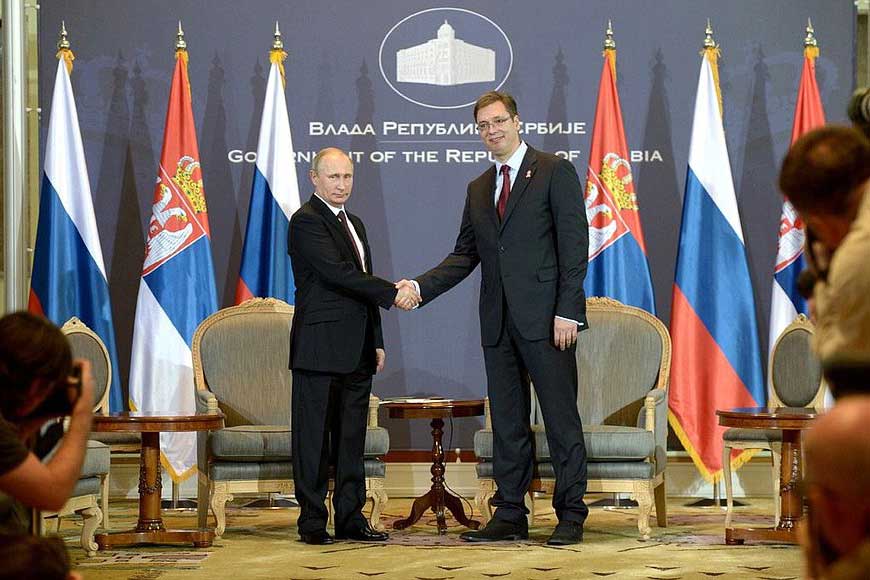
When my fellow Serbs go to the ballot box to choose a new president on Sunday, the focus should be less on the winner, more on what Serbia may be about to lose.
Polls put current Prime Minister Aleksandar Vucic on track for an easy win. Support for him wavers at around 50 per cent, raising the spectre of a first round victory. Such overwhelming endorsement would be taken as a mandate for continuing the country’s slide into authoritarianism.
The name of Vucic’s ruling party, the Serbian Progressive Party, is something of a misnomer. Since coming to power in 2012, his government has been anything but progressive. It has marched Serbia’s media into line, brought the country’s judges to heel and presided over continuous attacks on NGOs, journalists and opposition politicians. Vucic’s much vaunted anti-corruption campaign is used to selectively target the opposition rather than investigate allegations against most tycoons and his own party. Civil society, which demands greater transparency from governments, has been the subject of repeated attacks in pro-government media.
“Vucic’s pro-European market but anti-European principles brand of politcis has been embraced by Brussels”
All of this is being done while the European Union looks the other way. In November the European People’s Party even welcomed Vucic into their ranks. His brand of hybrid politics – pro-European market, anti-European principles, has been embraced by Brussels in a misguided effort to lure Serbia into the bloc and stave off Kremlin influence in Belgrade. Many policymakers in Brussels see him as a guarantor of stability and Serbia’s continued alignment with the West. They’re been counting on Vucic to acquiesce Kosovo’s independence in exchange for EU membership.
That approach is flawed on all counts. EU leaders need only to look at recent history to see how relying on authoritarian allies may offer short-term stability, but breeds instability in the long-term. The EU’s ill-fated attempt to sign an Association Agreement with the ludicrously corrupt former President Viktor Yanukovych is perhaps the most spectacular recent example of policy miscalculation. For years the EU overlooked rampant corruption and endemic police brutality in its eagerness to bring Ukraine into the fold, making it partially responsible for the frustrations that eventually boiled over into revolution and ultimately conflict in 2014.
Stirrings of discontent have already been rumbling in Belgrade’s Savamala district, where anti-corruption demonstrators are protesting an opaque deal with an Abu Dhabi investor to develop Belgrade’s vibrant waterfront. Authorities awarded the project without any public consultation and it got underway with scores of citizens being stopped and tied up by masked men. Meanwhile, construction workers demolished private property unannounced. Police were called to help and refused. The men in balaclavas were alleged to be acting on the orders of the city mayor – a close collaborator of Vucic.
“In the darkest days of Milosevic’s rule, my father draped a defiant EU flag across our Belgrade balcony”
By accepting Ukraine’s descent into despotism, the EU only made Yanukovych’s pivot to autocratic Russia more likely. The EU is making a similar mistake in Serbia. Unable to deliver higher standards of living, Vucic has relied on stoking pro-Russian sentiment to bolster his Slavic nationalist support base. His recent wooing of Moscow – meeting Putin last week – should sound alarm bells in Brussels. The EU needs to reign in Vucic while more Serbs still support accession, not wait until Kremlin propaganda has eaten away further at that figure and it is already too late. In 2009, 67 per cent of Serbia wanted to join the EU, with 16 per cent against. By 2017, that figure has dropped to 45 per cent for the EU, with 35 per cent against.
There is nothing I would like more than to see my country become part of the European Union. In 1998, in the darkest days of Milosevic’s rule, my late father draped a defiant EU flag across our Belgrade balcony. Twenty years later the flag remains, a symbol of my family’s desire to see our country become part of a stable, just and peaceful continent.
Yet going through the motions of EU accession while the Serbian government are busy undermining key bloc criteria – such as rule of law and press freedom – can only end badly. Serbs are being encouraged to have European aspirations that can’t be realised as long as their leadership rejects European values. And the ruling elite will continue consolidating their power at the expense of democracy as long as the EU remains silent.
There is an alternative. Brussels should recognise that Serbians’ EU aspirations are, for now, a powerful political tool, one the EU should not be afraid to use. Back in 2011, a single EU letter asking the Serbian government to investigate 24 suspicious privatisation deals sent shockwaves through the political elite and invigorated an anti-corruption movement. That movement desperately needs support today. The EU must start taking up concrete cases if it is to make a difference in Serbia, and the Belgrade Waterfront deal would make a good first start. My father didn’t live to see his country become genuinely European and now it seems as though his dream is fading fast. I hope I will.